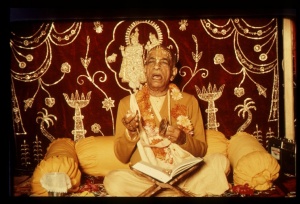CC Antya 4.69 (1975): Difference between revisions
(Vanibot #0027: CCMirror - Mirror CC's 1996 edition to form a basis for 1975) |
(Vanibot #0020: VersionCompareLinker - added a link to the Version Compare feature) |
||
| Line 2: | Line 2: | ||
<div style="float:left">'''[[Sri Caitanya-caritamrta (1975)|Śrī Caitanya-caritāmṛta (1975)]] - [[CC Antya (1975)|Antya-līlā]] - [[CC Antya 4 (1975)|Chapter 4: Sanātana Gosvāmī Visits the Lord at Jagannātha Purī]]'''</div> | <div style="float:left">'''[[Sri Caitanya-caritamrta (1975)|Śrī Caitanya-caritāmṛta (1975)]] - [[CC Antya (1975)|Antya-līlā]] - [[CC Antya 4 (1975)|Chapter 4: Sanātana Gosvāmī Visits the Lord at Jagannātha Purī]]'''</div> | ||
<div style="float:right">[[File:Go-previous.png|link=CC Antya 4.68 (1975)|Antya-līlā 4.68]] '''[[CC Antya 4.68 (1975)|Antya-līlā 4.68]] - [[CC Antya 4.70 (1975)|Antya-līlā 4.70]]''' [[File:Go-next.png|link=CC Antya 4.70 (1975)|Antya-līlā 4.70]]</div> | <div style="float:right">[[File:Go-previous.png|link=CC Antya 4.68 (1975)|Antya-līlā 4.68]] '''[[CC Antya 4.68 (1975)|Antya-līlā 4.68]] - [[CC Antya 4.70 (1975)|Antya-līlā 4.70]]''' [[File:Go-next.png|link=CC Antya 4.70 (1975)|Antya-līlā 4.70]]</div> | ||
{{CompareVersions|CC|Antya 4.69|CC 1975|CC 1996}} | |||
{{RandomImage}} | {{RandomImage}} | ||
==== TEXT 69 ==== | ==== TEXT 69 ==== | ||
<div class="verse"> | <div class="verse"> | ||
:viprād | :viprād dviṣaḍ-guṇa-yutād aravinda-nābha- | ||
:pādāravinda-vimukhāt | :pādāravinda-vimukhāt śvapacaṁ variṣṭham | ||
:manye tad-arpita-mano- | :manye tad-arpita-mano-vacane 'hitārtha- | ||
:prāṇaṁ punāti sa kulaṁ na tu | :prāṇaṁ punāti sa kulaṁ na tu bhūrimānaḥ | ||
</div> | </div> | ||
| Line 20: | Line 19: | ||
<div class="synonyms"> | <div class="synonyms"> | ||
viprāt—than a brāhmaṇa; dvi-ṣaṭ-guṇa-yutāt—who has twelve brahminical qualifications; aravinda-nābha—of Lord Viṣṇu, who has a lotuslike navel; pāda-aravinda—unto the lotus feet; vimukhāt—than a person bereft of devotion; śva-pacam—a caṇḍāla, or | viprāt—than a brāhmaṇa; dvi-ṣaṭ-guṇa-yutāt—who has twelve brahminical qualifications; aravinda-nābha—of Lord Viṣṇu, who has a lotuslike navel; pāda-aravinda—unto the lotus feet; vimukhāt—than a person bereft of devotion; śva-pacam—a caṇḍāla, or person accustomed to eating dogs; variṣṭham—more glorified; manye—I think; tat-arpita—dedicated unto Him; manaḥ—mind; vacane—words; ahita—activities; artha—wealth; prāṇam—life; punāti—purifies; saḥ—he; kulam—his family; na tu—but not; bhūri-mānaḥ—a brāhmaṇa proud of possessing such qualities. | ||
</div> | </div> | ||
| Line 27: | Line 26: | ||
<div class="translation"> | <div class="translation"> | ||
" 'One may be born in a brāhmaṇa family and have all twelve brahminical qualities, but if in spite of being thus qualified he is not devoted to the lotus feet of Lord Kṛṣṇa, who has a navel shaped like a lotus, he is not as good as a caṇḍāla who has dedicated his mind, words, activities, wealth and life to the service of the Lord. Simply to take birth in a brāhmaṇa family or to have brahminical qualities is not sufficient. One must be a pure devotee of the Lord. Thus if a śvapaca, or caṇḍāla, is a devotee, he delivers not only himself but his entire family as well, whereas a brāhmaṇa who is not a devotee but simply has brahminical qualifications cannot even purify himself, what to speak of his family.' | |||
</div> | </div> | ||
| Line 34: | Line 33: | ||
<div class="purport"> | <div class="purport"> | ||
This is a verse from Śrīmad-Bhāgavatam ([[SB 7.9. | This is a verse from Śrīmad-Bhāgavatam ([[SB 7.9.9|7.9.9]]). | ||
</div> | </div> | ||
Latest revision as of 02:13, 27 January 2020

A.C. Bhaktivedanta Swami Prabhupada
TEXT 69
- viprād dviṣaḍ-guṇa-yutād aravinda-nābha-
- pādāravinda-vimukhāt śvapacaṁ variṣṭham
- manye tad-arpita-mano-vacane 'hitārtha-
- prāṇaṁ punāti sa kulaṁ na tu bhūrimānaḥ
SYNONYMS
viprāt—than a brāhmaṇa; dvi-ṣaṭ-guṇa-yutāt—who has twelve brahminical qualifications; aravinda-nābha—of Lord Viṣṇu, who has a lotuslike navel; pāda-aravinda—unto the lotus feet; vimukhāt—than a person bereft of devotion; śva-pacam—a caṇḍāla, or person accustomed to eating dogs; variṣṭham—more glorified; manye—I think; tat-arpita—dedicated unto Him; manaḥ—mind; vacane—words; ahita—activities; artha—wealth; prāṇam—life; punāti—purifies; saḥ—he; kulam—his family; na tu—but not; bhūri-mānaḥ—a brāhmaṇa proud of possessing such qualities.
TRANSLATION
" 'One may be born in a brāhmaṇa family and have all twelve brahminical qualities, but if in spite of being thus qualified he is not devoted to the lotus feet of Lord Kṛṣṇa, who has a navel shaped like a lotus, he is not as good as a caṇḍāla who has dedicated his mind, words, activities, wealth and life to the service of the Lord. Simply to take birth in a brāhmaṇa family or to have brahminical qualities is not sufficient. One must be a pure devotee of the Lord. Thus if a śvapaca, or caṇḍāla, is a devotee, he delivers not only himself but his entire family as well, whereas a brāhmaṇa who is not a devotee but simply has brahminical qualifications cannot even purify himself, what to speak of his family.'
PURPORT
This is a verse from Śrīmad-Bhāgavatam (7.9.9).